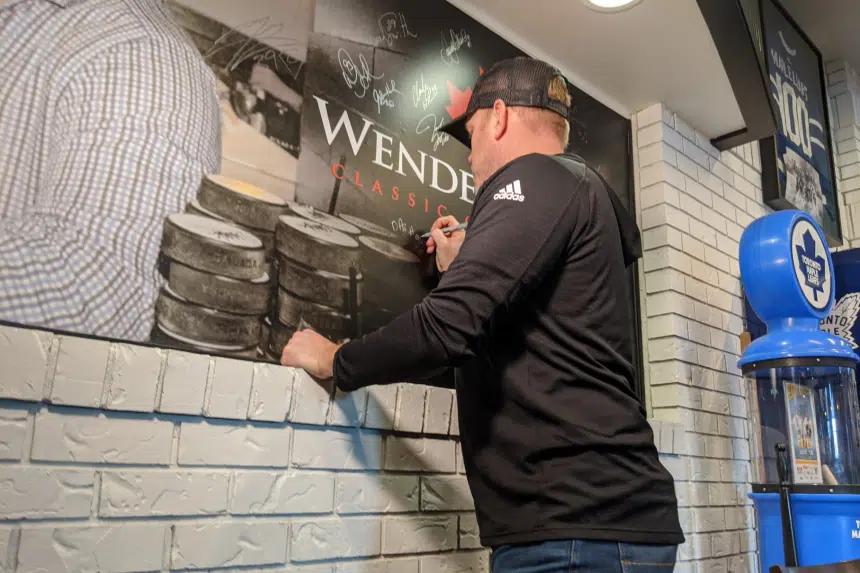Seas of autographs, selfies and media requests — that’s been the norm for David Ayres the last two weeks.
The 42-year-old operations manager at the Mattamy Athletic Centre in Toronto gained international recognition on Feb. 22 when he backstopped the Carolina Hurricanes to a win over the Toronto Maple Leafs after taking to the net as an emergency backup goaltender halfway through the game when both of Carolina’s goalies were injured.
Since that performance, Ayres has flown all over North America. From touring morning shows and an appearance on The Late Show with Stephen Colbert to pumping up ‘Canes fans in his new adopted home of Raleigh, N.C. — Ayres has been living the life of a hockey celebrity.
“I haven’t really slept in my own bed too much to be honest with you. I’ve been all over the place,” Ayres said Friday shortly after landing in Saskatoon for the latest stop on the tour.
His everyday man story of living out a dream captured the imagination of people across the world. Even the stick he used in that game is now on display at the Hockey Hall of Fame.
“Sometimes I say it doesn’t even feel like I played a hockey game because of all of the stuff that’s gone on afterwards,” he said. “Getting to meet so many people and go so many places, it’s been fun as well.”
Ayres’ appearance in the city was to promote the Saskatoon Blades game against the Regina Pats for the WHL Suits Up night to promote organ donation.

David Ayres poses for a photo while signing autographs at a Saskatoon Blades game on March 6, 2020. (Keenan Sorokan/650 CKOM)
Arguably one of the most famous hockey players to play in half a game, Ayres has been taking his journey in stride while lending his 15 minutes of fame to an admirable cause that’s close to him.
Ayres became ill in 2003 after repeatedly getting strep throat year after year. What first started out as flu symptoms quickly turned into something else. A trip to the doctor revealed he only had roughly 10 to 15 per cent usage in both of his kidneys, making a transplant the only option.
“You don’t really recognize it until it’s too late,” he said. “You’re sick to your stomach quite often, but you just feel like you have a really bad flu and you can’t shake it.”
A year later, the wait was over and Ayres’ transplant was complete with the help of his donor— his mother.
Immediately after the surgery Ayres thought he was healthy enough to pursue his dreams of playing pro hockey, but the toll of constant dialysis made Ayres lose roughly 40 pounds, well off his playing weight. Taking a break from competitive hockey allowed Ayres to work for the Toronto Marlies, where his journey as a backup goaltender would begin.
Suzanne D’aprile, the coordinator of community development at The Kidney Foundation of Canada, watched Ayres media availability prior to the game from a distance while wearing a jersey in support of Green Shirt Day, the organ donation awareness day that began after Logan Boulet’s story began to spread.
Boulet was one of the 16 members of the Humboldt Broncos that died when the team bus collided with a semi truck on the way to a playoff game on April 6, 2018.
Before his death, Boulet informed his family of his wishes to donate his organs. When he died two days after the crash his organs were donated across Canada, sparking the Logan Boulet Effect, a phenomenon for organ donation in Canada as thousands of people registered to become donors.
“To have hockey … talking about organ donation, having Logan Boulet and David Ayres — it’s a partnership of a lifetime,” D’aprile said.
A quick stop in Calgary Friday morning allowed Ayres to meet Logan’s father, Toby Boulet. It didn’t take long for an impression to be made.
“What he said was, ‘if you pass, you don’t need your organs anymore’,” Ayres said of Boulet’s father. “Someone else can you them and you can save someone’s life that way.”

Interviews and conversations with reporters are all in a day’s work for David Ayres since his emergency goalie appearance last month. (Keenan Sorokan/650 CKOM)
Stopping to pose for photos at the airport, shaking hands and penning autographs for his newfound fans are all a part of Ayres’ new gig. He figures he’s autographed “easily in to the five to 10 thousand” range.
Ayres finally had some time to watch a recording of the Feb. 22 game at home recently even though he didn’t want to based on his own grading of his performance.
“I was hesitant to watch it because I knew how shaky I was in that game,” Ayres said. “Just very stiff — you don’t want to make yourself look bad, so you’re kind of moving like a stick man, staying in the middle of the crease and not moving too much.”
That tough reflection has Ayres itching to get back on the ice for some redemption. He’ll get the opportunity, too. While he hasn’t had any time to be on the ice since his famous appearance, he’s scheduled to be an emergency backup for three games in Toronto this week.
“I can’t wait,” he said before tempering his excitement and not wishing injuries on anyone. “If I do get the chance, I’ll be a little less nervous this time. It took half that first period to calm myself down.”
Much of Ayres’ credit goes to his wife. Admitting that the organizational duties mostly fall on her shoulders, he’s been glad his whirlwind spokesman tour has been organized solely by his wife.
“My wife is now my agent, the poor girl,” he said, mentioning he’s added another agent in response to the requests for movie and book deals.
“She’s put her job on hold and she’s handling everything for me.”
There’s no sign if or when Ayres’ life will ever return back to normal, but if the rest of it continues like the past two weeks, he’ll take it.
“I don’t think it will be totally ever back to normal, but normal for me will be fine,” Ayres said.











